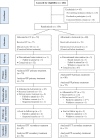Double-blind randomized controlled trial of letrozole versus clomiphene citrate in subfertile women with polycystic ovarian syndrome
- PMID: 28854590
- PMCID: PMC5850470
- DOI: 10.1093/humrep/dex227
Double-blind randomized controlled trial of letrozole versus clomiphene citrate in subfertile women with polycystic ovarian syndrome
Abstract
Study question: Would letrozole as a primary ovulation induction agent generate better pregnancy rates than clomiphene citrate (CC) in subfertile women with anovulatory polycystic ovarian syndrome (PCOS)?
Summary answer: Participants receiving letrozole as a primary treatment achieved a significantly (P = 0.022) higher clinical pregnancy rate per patient (61.2%) compared to CC (43.0%).
What is known already: According to a recent Cochrane systematic review (2014), letrozole appears to improve live-birth (LB) and pregnancy rates in anovulatory women with PCOS, compared to CC. However, the review concluded that the quality of evidence was low due to poor reporting of study methods and possible publication bias.
Study design, size, duration: This double-blind randomized controlled trial (RCT) included 159 participants between April 2007 and June 2014. Subjects were randomly allocated to either CC (n = 79) or letrozole (n = 80) in a 1:1 ratio. Both drugs were encapsulated to look identical. Randomization was performed in mixed blocks and stratified by patients' BMI (<30 and 30-35 kg/m2).
Participants/materials, setting, methods: The trial included subfertile women diagnosed with PCOS. Treatment started with one tablet (CC 50 mg, letrozole 2.5 mg) increasing to two in non-responders and continuing until pregnancy or for up to six ovulatory cycles. Non-responders were crossed over to the other treatment after a 6-week break. Cycles were initially monitored with ultrasound follicle tracking then mid-luteal serum progesterone measurement in subsequent cycles.
Main results and the role of chance: Amongst the 159 participants included in the intention-to-treat analysis, four women conceived before treatment and six were lost-to-follow-up. The remaining 149 participants (74 on CC and 75 on letrozole) completed at least the first treatment. Women receiving letrozole achieved a significantly (P = 0.022; absolute difference [95% confidence interval] 18% [3-33%]) higher pregnancy rate (61.%) than those on CC (43%). The median number of treatment cycles received until pregnancy was significantly (log rank P = 0.038) smaller with letrozole (4[3-5] cycles) compared to CC (6[4-7] cycles). LB rates were not statistically (P = 0.089) different between the two groups, although there was a trend towards higher rates on letrozole (48.8%) compared to CC (35.4%). After the crossover, pregnancy and LB rates on letrozole (n = 45; 28.9 and 24.4%, respectively) were not statistically (P = 0.539 and P = 0.601) different from CC (n = 31; 22.6 and 19.4%).
Limitations, reasons for caution: One possible limitation of this trial may be the exclusion of PCOS women with BMI > 35 kg/m2, which would limit the applicability of the results in this subgroup of PCOS. However, this group of women are generally excluded from treatment in the majority of fertility centres, especially in Europe, due to the associated challenges and risks.
Wider implications of the findings: The results of this trial are consistent with the recent Cochrane systematic review. However, with its robust design, the current RCT provides more valid and compelling evidence for the superiority of letrozole over CC as a primary ovulation induction agent in PCOS women with 40% increase in pregnancy rates and with a shorter time-to-pregnancy. Furthermore, the participants in this RCT are a good representation of subfertile PCOS population receiving fertility treatment in Europe and worldwide. The results are therefore globally generalizable for clinical practice.
Study funding/competing interest(s): This RCT was mainly funded by the R&D Funding Scheme of Derby Hospitals NHS Foundation Trust. The study also received funds from School of Medicine, University of Nottingham. The Trust R&D department was involved in the development of the protocol and the running of the trial. The trial was sponsored and monitored by the University of Nottingham. The authors have no conflicts of interest.
Trial registration number: www.Clinicaltrials.gov: NCT00478504.
Trial registration date: Registration was verified on 23/05/2007.
Date of first patient's enrolment: 25/04/2007.
Keywords: aromatase inhibitors; clomiphene citrate; infertility; letrozole; ovulation induction; polycystic ovarian syndrome.
© The Author 2017. Published by Oxford University Press on behalf of the European Society of Human Reproduction and Embryology.
Figures
Comment in
-
Excerpts from the World Medical Literature.J Obstet Gynaecol Can. 2018 Jul;40(7):865-867. doi: 10.1016/j.jogc.2018.04.022. J Obstet Gynaecol Can. 2018. PMID: 29921426 No abstract available.
References
-
- Al-Omari WR, Sulaiman WR, Al-Hadithi N. Comparison of two aromatase inhibitors in women with clomiphene-resistant polycystic ovary syndrome. Int J Gynecol Obstet 2004;85:289–291. - PubMed
-
- Asuncion M, Calvo RM, San Millan JL, Sancho J, Avila S, Escobar-Morreale HF. A prospective study of the prevalence of the polycystic ovary syndrome in unselected Caucasian women from Spain. J Clin Endocrinol Metab 2000;85:2434–2438. - PubMed
-
- Atay V, Cam C, Muhcu M, Cam M, Karateke A. Comparison of letrozole and clomiphene citrate in women with polycystic ovaries undergoing ovarian stimulation. J Int Med Res 2006;34:73–76. - PubMed
-
- Dickey RP, Holtkamp DE. Development, pharmacology and clinical experience with clomiphene citrate. Hum Reprod Update 1996;2:483–506. - PubMed
-
- Franik S, Kremer JA, Nelen WL, Farquhar C. Aromatase inhibitors for subfertile women with polycystic ovary syndrome. Cochrane Database Syst Rev 2014:CD010287. - PubMed
Publication types
MeSH terms
Substances
Associated data
LinkOut - more resources
Full Text Sources
Other Literature Sources
Medical
Molecular Biology Databases
Research Materials
Miscellaneous


